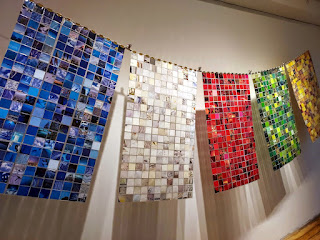Remembering my Dad
This is one of my favorite pictures, taken around 1943, probably by my grandmother; my Uncle Dave, Dad's best friend, Billy Allhouse, Dad, and Dave's best friend, Charlie Medd.
Now they've all passed away, or, as we Presbyterians say, they've joined the Church Triumphant. That is, I'm not positive about Charlie, but as far as I know, they all graduated within a year or so of this picture, all served in the military, raised families and lived full lives.
To me this picture provides proof that there is Baseball in Heaven.
Dad would be ninety-seven. He would have hated being ninety-seven. He died twenty years ago, too soon as far as we were concerned but he avoided many of the indignities of old age and made a clean getaway. Shortly after he died I found this poem.
Father
Ted Kooser
May 19, 1999
Today you would be ninety-seven
if you had lived, and we would all be
miserable, you and your children,
driving from clinic to clinic,
an ancient, fearful hypochondriac
and his fretful son and daughter,
asking directions, trying to read
the complicated, fading map of cures.
But with your dignity intact
you have been gone for twenty years,
and I am glad for all of us, although
I miss you every day--the heartbeat
under your necktie, the hand cupped
on the back of my neck, Old Spice
in the air, your voice delighted with stories.
On this day each year you loved to relate
that at the moment of your birth
your mother glanced out the window
and saw lilacs in bloom. Well, today
lilacs are blooming in side yards
all over Iowa, still welcoming you.
There's a lot about Dad here, although he used St. John's Bay Rum instead of Old Spice, but definitely a spring birthday with lilacs and so many stories. It's interesting what can waken your memory and bring a missing dear one right back to you. That's why on my playlist I keep Joe Turner, the great blues shouter. Dad would wake up bright and cheery on Saturday mornings and sing
"Get out in that kitchen, make some noise with the pots and pans!" That was Shake Rattle and Roll, but the one that we'd dance to, the one he taught me the Lindy to was Corinna Corinna.
I really hope this link works and you get to hear Big Joe with little effort. If it doesn't work you can simply google Joe Turner, Corinna Corinna. If this doesn't get you dancing I don't have much hope for you.
Here we are together at a celebration--Alan and Donna's wedding.
At another wedding, that of Alan and Donna's son, Danny, and his bride Priya, I was dancing with Arthur when Sam cut in. That was nice, but here's the story. It was just a year after Mom and Dad had both died. Sam was sitting with the family and said, "I danced with my Mom at my friend's Bar Mitzvah so I'm covered for a while." And my brother Rob said, a little teary-eyed, "Sam, do you know what I'd give to dance with my Mom today?"
Also, this week, and fitting that it falls so close to Earth Day, we celebrate the two hundredth birthday of the great Frederick Law Olmstead. I read all about him in Witold Rybczynski's terrific biography,
A Clearing in the Distance;
Frederick Law Olmstead and America in the 19th Century
He was the designer of Central Park, Stanford University's campus, Boston's Back Bay fens and the grounds of Biltmore. He cofounded The Nation magazine and during the Civil War served as the executive secretary of the United States Sanitary commission, precursor of the Red Cross.
In 1861 he published “The Cotton Kingdom: A Traveller’s Observations on Cotton and Slavery in the American Slaves States.” He spoke against the cotton monopoly saying that economically, it committed southerners to single-crop agriculture which depleted the soil and made them reliant on imports; politically, it empowered and emboldened the slaveholding planter elite; morally, it led to their destitution. However, he was not an abolitionist, believing that it would take generations and great care to to heal the wounds of slavery. He wasn't wrong there.
What I take here is that when you work to care for the Earth you're also working for justice.
So I give thanks for two very different men who shared a love of hard work and enjoyed the fruits of their labors. They each left a legacy that I cherish.







Thank you, Barbara, very fine!
ReplyDelete